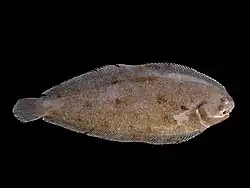tunge
Danish
Pronunciation
- IPA(key): [ˈtˢɔŋə]
Etymology 1
From Old Danish tungæ, Old Norse tunga, Proto-Germanic *tungǭ, cognate with English tongue, German Zunge, Gothic 𐍄𐌿𐌲𐌲𐍉 (tuggō). The Germanic word goes back to Proto-Indo-European *dn̥ǵʰwéh₂s (“tongue”), cf. Latin lingua, Sanskrit जिह्वा (jihvā́).
Noun
tunge c (singular definite tungen, plural indefinite tunger)
- (anatomy) tongue
- sole (fish)
- (poetic) language
- 1856, Frederik E. Schiern, Historiske studier, page 86:
- Men da ei Grunden blev tilstrækkelig / For Folkets Antal, drog de over til / Det sorte Bjerg, ja til det hvide Land, / Hvor, skjult bag ved en evig Muur af Iis, / Et andet Folk med anden Tunge taler.
- But when the place was insufficient / For the numbers of the people, they went to / The black mountain, yes, to the white land, / Where, hidden behind an eternal wall of ice, / Another people in another tongue speaks.
- 2014, Joseph Conrad, Lord Jim, Rosinante & Co, →ISBN:
Inflection
Etymology 2
See tung (“heavy”).
Finnish
Pronunciation
- IPA(key): /ˈtuŋːe/, [ˈt̪uŋːe̞]
- Rhymes: -uŋːe
- Syllabification(key): tun‧ge
Verb
tunge
- inflection of tunkea:
- present active indicative connegative
- second-person singular present imperative
- second-person singular present active imperative connegative
Anagrams
Middle English
Norwegian Bokmål
Noun
tunge f or m (definite singular tunga or tungen, indefinite plural tunger, definite plural tungene)
- a tongue
Derived terms
References
- “tunge” in The Bokmål Dictionary.
Norwegian Nynorsk
Pronunciation
- IPA(key): /²tʊŋːə/
Etymology 1


From Old Norse tunga f, from Proto-Germanic *tungǭ f (“tongue”), from an N-stem variant of earlier Proto-Indo-European *dn̥ǵʰwéh₂s f (“tongue”).
Nordic cognates include Icelandic, Faroese, Norn, and Swedish tunga, Danish tunge, Elfdalian tungga. Other Germanic cognates include English tongue, West Frisian tonge, Dutch tong, German Zunge, and Gothic 𐍄𐌿𐌲𐌲𐍉 (tuggō).
Indo-European cognates include Armenian լեզու (lezu), Irish teanga, Latin lingua, Lithuanian liežuvis, Northern Kurdish ziman, Persian زبان, Polish język, Russian язык (jazyk), Sanskrit जिह्वा (jihvā), Tocharian A käntu, Tocharian B kantwo, Welsh tafod.
Alternative forms
- (non-standard since 2012) tunga
Noun
tunge f (definite singular tunga, indefinite plural tunger, definite plural tungene)
- (anatomy) a tongue
- Menneske kan smaka med tunga.
- Humans can taste with their tongue.
- (metonymically) a language; speech
- (metonymically) a voice
- (religion, often in the plural) glossolalia
- something which resembles a tongue
- a flame
- a tongue in a swallowtail flag
- a tongue in a shoe
- Synonym: pløse
- (poetic) bladepoint; tip of a spear, sword, lance or other
- (zoology) Dover sole fish (Solea solea)
- Synonyms: tungeflyndre, sjøtunge, skosole
- (rail transport) points (Britain, Ireland, Australia, India); switch (US) (the part of the railway switch that actually moves)
- (fishing) This term needs a translation to English. Please help out and add a translation, then remove the text
{{rfdef}}.
Derived terms
- baktunge
- bite seg i tunga
- bretunge
- eldtunge
- folketunge
- ha kalvskit på tunga
- ha på tunga
- halde tunga beint i munnen
- hundetunge
- landtunge
- oksetunge
- ormetunge
- rette tunge
- sjøtunge
- smørtunge
- tale i tunger
- tale med to tunger
- tiriltunge
- tunga på glid
- tunga på vektskåla
- tunga ut av vindauget
- tungeband
- tungeflyndre
- tungemål
- tungerapp
- tungerot
- tungerygg
- tungeslag
- tungesnipp
- tungespiss
- tungetale
- tungete
- tungetipp
- tvitunga
- vekttunge
Noun
tunge m (definite singular tungen, indefinite plural tungar, definite plural tungane)
Etymology 3
See the etymology of the corresponding lemma form.
References
Anagrams
- gnute
Old English
Etymology
From Proto-West Germanic *tungā.
Pronunciation
- IPA(key): /ˈtun.ɡe/, [ˈtuŋ.ɡe]
Declension
Old Frisian
Etymology
From Proto-West Germanic *tungā, from Proto-Germanic *tungǭ.
Inflection
| Declension of tunge, tunga
(feminine n-stem) | ||
|---|---|---|
| singular | plural | |
| nominative | tunge, tunga | tunga |
| genitive | tunga | tungana, tungena |
| dative | tunga | tungum, tungem |
| accusative | tunga | tunga |
References
- Köbler, Gerhard, Altfriesisches Wörterbuch (4th edition 2014)
- Cummins, Adley H. (1887) A Grammar of the Old Friesic Language, London: Trübner & Co., page 45